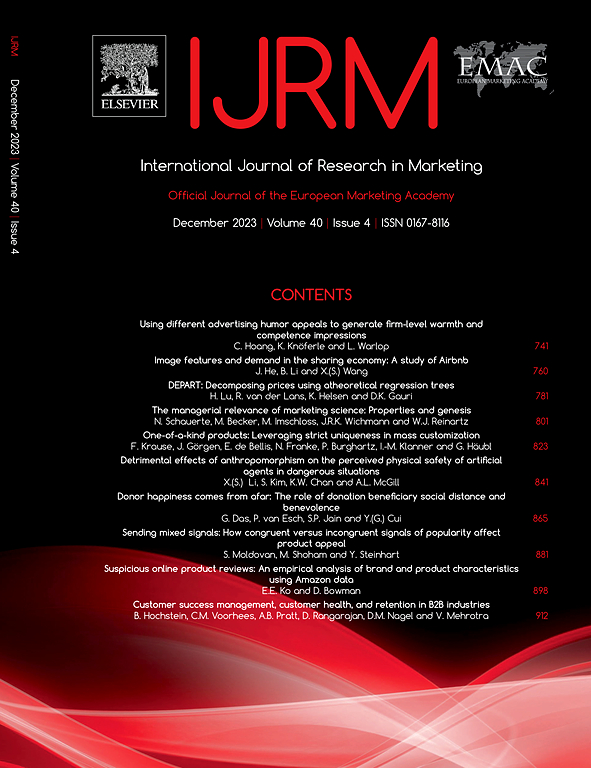新产品联盟中的即兴创作
IF 7.5
2区 管理学
Q1 BUSINESS
International Journal of Research in Marketing
Pub Date : 2025-09-01
DOI:10.1016/j.ijresmar.2025.01.003
引用次数: 0
摘要
新产品通常来自某种程度上的即兴创作(计划和执行的融合)。然而,由于先前的研究主要集中在组织内部的即兴创作,因此对联盟层面的即兴创作及其对新产品开发的影响知之甚少。根据广泛的文献,我们还提出,参与联盟的企业往往与拥有相似技能、缺乏共同历史、重视外部威胁的合作伙伴结盟。我们认为这些特征影响了新产品联盟中即兴创作的发生率和影响。我们对106家参与新产品联盟的美国公司进行了初步研究,测试了这三个特征对即兴创作发生率的影响。然后,我们通过对54家公司的后续研究,检验了这三个特征在多大程度上缓和了联盟即兴创作对新产品绩效的影响。我们发现,当联盟伙伴缺乏关系经验但拥有相似技能时,即兴发挥更有可能发生。此外,当联盟伙伴拥有相似的技能、共享关系经验、对外部威胁的重视程度较低时,联盟即兴对新产品绩效的影响会增强。然后,我们试图在第三项研究中复制我们的发现,该研究涉及252家最近参与新产品联盟的美国公司,并强调联盟即兴发挥的其他一些驱动因素,包括技能互补性、共享治理和文化契合。我们讨论了我们的研究对即兴学术的影响,提供了加强即兴实践的管理建议,并提出了新产品联盟中即兴的未来研究议程。本文章由计算机程序翻译,如有差异,请以英文原文为准。
Improvisation in new product alliances
New products often emerge from alliances engaged in some degree of improvisation (convergence of planning and execution). However, since prior research has mainly focused upon improvisation within organizations, little is known about alliance-level improvisation or how it impacts new product development. Drawing on a broad set of literatures, we also propose that firms participating in alliances often align with partners that possess similar skills, lack a shared history, and place importance on external threats. We propose that these characteristics influence both the incidence and impact of improvisation within new product alliances. We test the effect of these three characteristics upon the incidence of improvisation in an initial study of 106 U.S. firms engaged in new product alliances. We then examine the degree to which these three characteristics moderate the impact of alliance improvisation upon new product performance via a follow-up study among 54 of these firms. We find that improvisation is more likely to occur when alliance partners lack relational experience but share similar skills. Furthermore, the impact of alliance improvisation on new product performance is enhanced when alliance partners possess similar skills, share relational experience, and place low importance on external threats. We then seek to replicate our findings in a third study involving 252 U.S. firms recently engaged in new product alliances, and also spotlight a few other drivers of alliance improvisation, including skill complementarity, shared governance, and cultural fit. We discuss the implications of our research for improvisation scholarship, provide managerial recommendations for enhancing improvisation practice, and offer a future research agenda for improvisation in new product alliances.
求助全文
通过发布文献求助,成功后即可免费获取论文全文。
去求助
来源期刊
CiteScore
11.80
自引率
4.30%
发文量
77
审稿时长
66 days
期刊介绍:
The International Journal of Research in Marketing is an international, double-blind peer-reviewed journal for marketing academics and practitioners. Building on a great tradition of global marketing scholarship, IJRM aims to contribute substantially to the field of marketing research by providing a high-quality medium for the dissemination of new marketing knowledge and methods. Among IJRM targeted audience are marketing scholars, practitioners (e.g., marketing research and consulting professionals) and other interested groups and individuals.

 求助内容:
求助内容: 应助结果提醒方式:
应助结果提醒方式:


